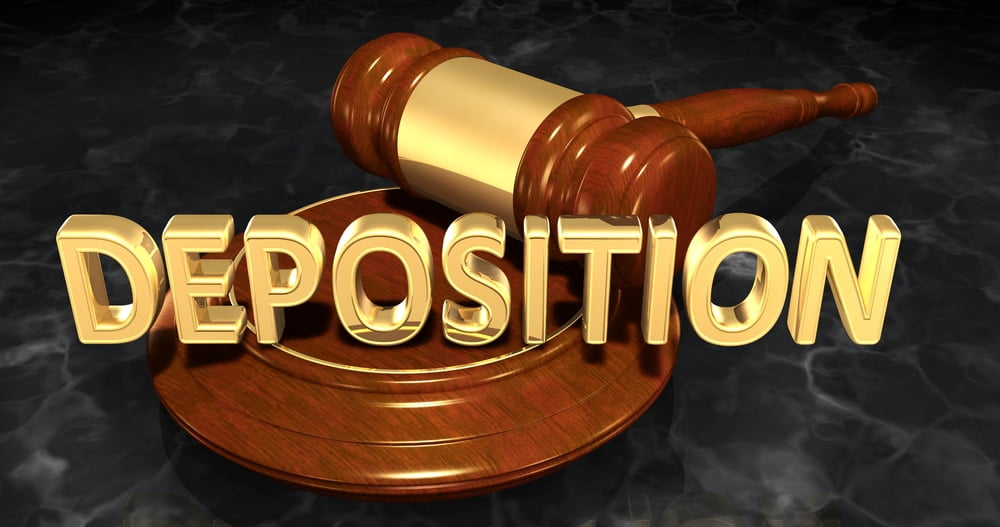There are a few parts of the proceedings in a given car accident liability case where the plaintiff will be directly involved, and one of the most notable in some such cases is a deposition. A deposition refers to an out-of-court setting where sworn testimony is given with the purpose of being used later in court during discovery, and plaintiffs who are testifying during discovery need to know a few things.
At the offices of William Rawlings & Associates, we’re here to offer the very best car accident attorney services you’ll find in Draper, Salt Lake City, Provo and nearby parts of Utah. We assist clients with every part of their case here, including any depositions that are required and the preparation you need for them. This two-part blog series on car accident depositions will begin by going over some basic plaintiff preparations and expectations for a deposition, while part two will look at the important steps that take place after your deposition is finished.

Be Prepared
During the days and weeks leading up to your deposition, it’s essential that you take the time to become well-prepared for it. This will mean learning all of the details of your case and understanding exactly what points are most relevant to the proceedings. You should also familiarize yourself with those who may be present in the room during the deposition, such as attorneys from both sides.
Speaking of attorneys, this is one area that highlights the immense value of working with a qualified car accident attorney throughout your case. An experienced car accident attorney can show you exactly how you should be preparing for your deposition – they can even do things like ask sample questions, review details of your case and answer any questions you have about the deposition process.
Know What the Defense is Going For
In virtually every car accident deposition, the goal of the defense attorney(s) will be the same in nature: To lock the plaintiff into a restrictive “version” of their story that can cast doubt on their case in court. This is why it’s essential to always be focused on the truth and avoid exaggerating or changing your story while under oath – no matter how much pressure is coming from the defense attorneys.
For many, this goes back to strong preparation and having a car accident attorney who can assist in such preparations. From there, remaining calm and composed during the deposition is always an important factor – being aware that the defense attorneys may be trying to bait you into saying something which could reflect poorly on your case is essential.
Only Speak When Necessary
Down these lines, it’s generally good to avoid getting too wordy or speaking too much during your deposition. While you should always provide complete and honest answers to questions, saying more than necessary can often lead to a complicated or confusing answer – something which can easily be used against you in court by the defense attorneys.
If you’re unsure of whether you should speak up about a given topic, it’s usually best to wait and consult with your car accident attorney first. As mentioned, having an experienced car accident lawyer to assist during the deposition is an invaluable resource that can provide valuable guidance throughout the entire process.
Remember That Non-Verbal Communication is Recorded
One common mistake that some car accident plaintiffs make during their depositions is forgetting that non-verbal communication such as facial expressions, body language and other reactions are still recorded. Even if you don’t say anything while under oath, the defense attorneys may use your non-verbal response to a question as evidence against you in court.
For this reason, it’s important to always remain as neutral and composed as possible – even when you’re being asked a difficult or uncomfortable question. Doing this will provide the greatest opportunity for success in your case, while also ensuring that the defense won’t have any evidence to use against you from your deposition.
Be Prepared for “Fishing” Questions
As we noted above, the defense attorneys may very well try to “fish” for answers that can cast doubt on your case – such as asking you something that has nothing to do with the accident itself, but instead gets at other unrelated areas of your personal life.
Although it’s important to answer all questions truthfully and accurately during deposition, it’s also wise to keep your answers focused on the accident itself – and just let your car accident attorney handle any questions that are out of bounds. Doing so can help you avoid getting tripped up on unrelated topics and keep the deposition as straightforward for you as possible.
With this information in mind, those who have been injured in a car accident should be better prepared to handle the deposition process. Ultimately, having a car accident attorney to assist with your case is – as always – the best way to ensure that you’re well-prepared for all aspects of the liability proceedings.
At the offices of William Rawlings & Associates, our experienced car accident lawyers are here to help you through the entire process – from filing for damages all the way to deposition preparation. Contact us today to learn more about how we can assist with your case, whether you’re located in SLC, Draper, Provo or any other part of Utah.